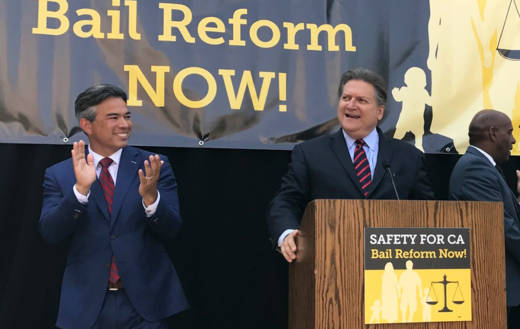"We've been working very hard on bail reform ... and what we've learned in that process is that these bail companies are just making an exorbitant profit," Hertzberg said, adding that he and Bonta continue to work with Gov. Jerry Brown, Chief Justice Tani Cantil-Sakauye and others on broader reforms that would require counties to set up pretrial service agencies that give courts an alternative to cash bail.
But since the bail reform bill doesn't eliminate money bail -- voters would have to weigh in on that change -- Hertzberg said it's also worth probing the broader industry.
He said the more he’s learned about bail, the more questions he has -- particularly about the insurance companies that back bail bond agents. Hertzberg said unlike other forms of insurance -- where prices are based on risk and companies regularly experience large losses -- bail surety companies appear to experience little or no losses.
"We think one of the elements of the discussion is, are people being gouged? Is the government creating a monopoly that’s creating these crazy prices? Should you be charged where there’s no risk?" he said.
When someone in California is arrested and charged with a crime, a judge often sets a bail amount they must pay in order to get out of jail. If the defendant doesn’t have the money, they can pay a fee to a bail bond agent, who essentially promises the court they’ll pay the full bail amount if the defendant skips out on court.
Those bail agents are backed by insurance companies that charge fees to agents for guaranteeing the bonds.
Jeff Clayton represents the insurance companies as a lobbyist for the American Bail Coalition. He said he’s baffled by the bill.
"We already do a lot of stuff that’s in this bill. We audit our agents regularly, at least annually. We are required to file a form with the Department of Insurance when we terminate somebody, and if there’s misconduct we have to tell the department. So I’m really kind of confused as to what they’re trying to do here," he said.
Clayton said he believes the lawmakers fundamentally misunderstand the bail surety industry.
"You know, even though it's considered an insurance product, it's not an insurance product -- it's a financial guarantee is all it is," he said, adding that it's illogical to compare bail surety to auto insurance because individuals don't purchase bail insurance.
"What we do is underwrite what the agents do, so when a bail goes bad we are ultimately on the hook for that," Clayton said. "(They say) losses are never paid but there's a reason for that -- because we require the agents to put money in what's called a buildup fund so they've actually already guaranteed to us they have substantial funds available to pay their losses."
The legislation will be taken up in January when lawmakers return to Sacramento.

